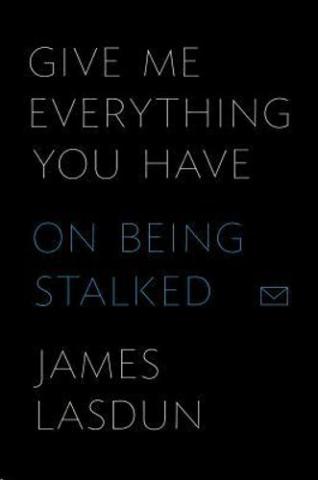Author James Lasdun on the Perils of Being Stalked

Give Me Everything You Have: On Being Stalked
By James Lasdun
Farrar Straus Giroux
218 Pages
In 2003, James Lasdun, a British-born poet and novelist living in the U.S., was teaching creative writing “at a place I’ll call Morgan College” in New York City. Among his students was an Iranian-American woman in her 30s whom he calls “Nasreen.” The excerpts she shared from her novel-in-progress impressed Lasdun, who agreed to pass them along to his literary agent. Within a couple of years, however, what began as a generous literary gesture turned sour. Despite the fact that he’d consistently maintained a professional distance from her (and all of his students), Nasreen begins sending him emails that cross over the line from amicable student-teacher relationship to full-blown obsession. The story of how a former student turned Lasdun’s life upside-down and wreaked havoc on his marriage and career forms the backdrop for this new memoir, Give Me Everything You Have.
By his own admission, Lasdun was slow to catch on to what was happening. At first he responded politely to Nasreen’s emails, only to get back increasingly bizarre messages (“You had no integrity with me” and “your kids have a future of being thought of as Nazi Germans”). Still he hoped this was all just a bad misunderstanding:
“Though I didn’t quite know it yet, I had entered the realm of stricken enchantment in which technology and psychology overlap, where the magical thinking of the primitive mind, with its susceptibility to spells, curses, witchcraft of every kind, converges with the paranoias peculiar to our own age.”
Things would get worse, much worse. Nasreen’s emails become shrill, accusatory and (perhaps inevitably, given the circumstances) virulently anti-Semitic. They come every day, dozens of them, a ceaseless stream of invective that causes Lasdun to dread going to his email in-box at all. She defames his Wikipedia bio, writes scurrilous reviews of his work on Amazon and Goodreads, then spreads her accusations like a contagion to his agent, a prospective university employer and others in his professional network. Lasdun feels powerless to stop her and utterly bewildered by the echo-chamber effect of libel and slander:
“The multiplying effect of the Internet—the knowledge that anything on it can be infinitely reproduced—is a further element in the alarm this kind of attack induces. So too is its odd nature as a mass phenomenon in which, paradoxically, one participates in the blindest, most solitary manner. Who else has seen what you have seen? Who believes it? Who has copied it, posted it elsewhere, mailed it to a friend? One never knows, but where malice is involved, one quickly succumbs to the worst suspicions.”

The first part of Give Me Everything You Have makes for arresting, train-wreck reading; the reader can’t look away from the rapidly deteriorating situation Lasdun describes. Assuming he’s being truthful in his account—and there’s no reason to doubt him—Lasdun is a decent, scrupulous and ethical individual. Though he’s forced to occasionally give in to self-recriminations, it’s clear he’s done nothing to deserve the “verbal terrorism” Nasreen inflicts on him and people he knows. He’s living a nightmare, one exquisitely resonant of our life and times. Nasreen has no need or apparent desire to stalk him in person, not when she has such a vast array of Internet weaponry at her command.
But as the memoir continues, Lasdun makes the critical decision to move far beyond the gripping story of his personal travails. A thoughtful man, he probes his own reflections and the ideas of others about gender and race injustices, literary antecedents that might in some way shed light on his present dilemma and, in the last part of the book, offers a long account of a trip to Jerusalem he took as research for an article he’s hired to write. A reader can practically feel the tension ooze from the narrative, like air from a slow-leaking tire. It’s not to say this final section of his memoir lacks interest, but he’s so successful early on in describing the menace pervading his life that later ruminations pale by comparison.
In the end, Lasdun copes with his unseen stalker the only way he can—by writing about her:
“Nasreen’s uncanny ability to get under my skin—all the little neuroses and insecurities of mine that she had so cleverly intuited and exploited—made her, potentially, an extremely illuminating subject as far as my interest in these murky aspects of myself was concerned. There would be the armature of the case itself, but beyond it, if I could get it right, would be a larger story woven from memories, journeys, portraits, observations—all the stray psychic material that had been drawn into orbit around the drama that had monopolized my consciousness for more than three years now … All of which, I am willing to concede, may have been merely the false excitement of desperation: the knowledge that I had to do something if I wasn’t going to jump off a bridge, that writing was what I knew how to do best, and that at this point the only subject I was capable of writing about was Nasreen.”
And he does, superbly at times, giving readers a frightening look inside the darker regions of cyberspace.
Author:
Lee Polevoi, Highbrow Magazine’s chief book critic, is the author of a novel, The Moon in Deep Winter.
Photo: Adam Thomas (Flickr).






























































































































































































































































































































